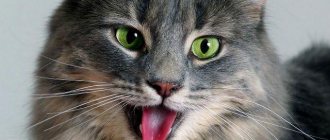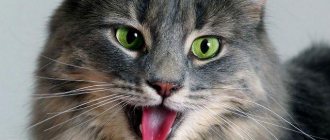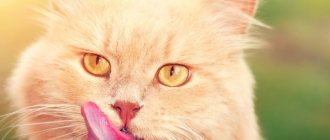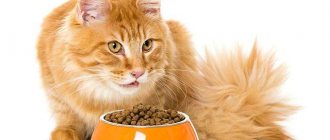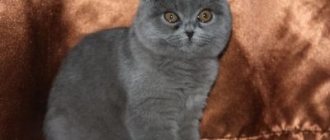Physiological reasons
In cats, as in humans, breathing through the nose is considered the physiological norm. It is not uncommon to see a cat breathing with its mouth open and its tongue hanging out like a dog. It is noticeable that with this method of breathing the abdominal muscles are involved: the cat breathes not from the chest, but from the stomach.
Nature has created a vacuum in the chest cavity around the lungs. When the pectoral muscles work while inhaling, the ribs diverge - the lungs straighten and fill with air, which enriches the blood with oxygen.
If there is a lack of oxygen, an “emergency” breathing mode is activated and the abdominal muscles are activated. The body tries to increase the amount of air inhaled - it increases breathing movements.
As soon as the oxygen level in the blood returns to normal, abdominal breathing “turns off” - the cat breathes calmly, through the chest, through the nose. If the animal does not have any pathological changes in the body, such conditions correspond to the norm and quickly pass when the negative factor is eliminated.
Natural external reasons why a cat breathes with its mouth open are:
- Hot. It is known that as the air temperature rises, the oxygen content decreases. The body's need for this element increases. The brain introduces a mode of “enhanced ventilation” - breathing becomes more frequent. Long-haired cats have a particularly hard time withstanding the heat: Maine Coons, Persians, Siberians. The owner's job is to keep the animal cool.
- Rapid breathing is often observed in cats that are obese. If a cat has suddenly gained weight, then you can often observe that the animal is breathing heavily with its mouth open. After the body adapts to the extra load or returns to normal (which is preferable), these phenomena disappear.
- After increased physical activity. Kittens are especially susceptible to this. Kids do not yet know how to regulate the load and after playing they get so tired that they “lay around without their hind legs” and often breathe with their mouths open and stick out their tongues. If the kitten breathes with an open mouth, then the reason for this may be irrepressible running and active play.
- Generic activity. During contractions and pushing, the uterus contracts, which limits the supply of oxygen to the organ. To avoid hypoxia in newborn kittens, the mother's body turns on increased breathing to protect the babies from suffocation. In this case, this is a necessary measure.
- The first time after giving birth and while feeding kittens, the cat may breathe rapidly with its mouth open, this is normal.
- Sexual hunting. During this period, the endocrine system of cats works in active mode: increased releases of sex hormones into the blood occur. Increased activity of the endocrine glands requires more oxygen - cats breathe frequently.
- Stressful situations. By frequent, heavy breathing with an open mouth, the animal’s body responds to psychological discomfort.
When these causes are eliminated, the cat quickly restores normal respiratory activity.
Symptoms
The main symptoms of tongue swelling are its increase in size and swelling. In difficult cases, the patient has difficulty breathing, and there is a sensation of a foreign object in the mouth. The mucous membrane becomes loose, with prominent papillae, and tooth marks become noticeable on the lateral surfaces. Blood vessels become clearly visible on the lower part of the tongue.
Swelling is accompanied by other symptoms:
- Change in taste sensations.
- Change in color of the mucous membrane.
- The appearance of heaviness when swallowing.
- Increased body temperature.
- Swelling of lips.
- Hyperemia of the mucous membrane.
- Paleness of the skin.
If the problem is not detected in a timely manner, the tongue continues to swell, does not fit in the oral cavity, and falls out. The help of a doctor cannot be neglected. If the tongue is swollen and this process persists for several days, it is dangerous to self-medicate or wait until the problem goes away on its own.
Pathological causes
Rapid breathing with an open mouth and protruding tongue indicates a lack of air in the cat’s body - oxygen starvation. If the natural causes of this condition have been eliminated, and the cat continues to breathe too quickly, do not hesitate, you need to show the animal to a specialist.
The reason for this may be dangerous pathological conditions.
Pulmonary edema
When they talk about pulmonary edema, they mean excessive accumulation of fluid in the tissues of the organ. This is not an independent disease, but a symptom. In cats, pulmonary edema can develop for two reasons: cardiogenic (edema is provoked by some kind of cardiac pathology) and non-cardiogenic - caused by external influences.
Non-cardiogenic causes:
- hot air entering the respiratory tract;
- reaction to medications, including anesthesia;
- allergy;
- consequences of pneumonia or asthma;
- food poisoning or inhalation of toxic fumes;
- renal failure;
- head injury with damage to the brain and its membranes;
- blood poisoning;
- sun, heatstroke or electric shock.
Pulmonary edema develops very quickly, and if urgent rescue measures are not taken, the cat may die. This condition has pronounced symptoms and is easy to identify:
- the cat suddenly loses strength and stops responding to external stimuli;
- it is noticeable that the animal is having difficulty breathing;
- the animal coughs, breathes with its mouth slightly open, sticks out its tongue;
- mucous membranes rapidly turn pale, subsequently acquiring a bluish tint;
- when coughing, pinkish sputum appears - the result of injury to the alveoli;
- the initially rapid heartbeat weakens and becomes intermittent;
- As a result of impaired peripheral circulation, the cat's paws become cold.
Accumulation of fluid or air in the chest cavity
In case of injuries that are accompanied by damage to the skin and muscle frame or rib fractures, air can enter the cat's chest cavity. It prevents the lungs from fully expanding when inhaling. This condition is called pneumothorax.
Also, as a result of injury or internal bleeding, blood can enter the chest cavity. With various pathological conditions, there may be an accumulation of other body fluids, which interferes with the normal functioning of the cat’s lungs. This condition is called hydrothorax.
A cat can get rib fractures and penetrating wounds if it falls from a height or receives a strong blow. Only a veterinarian can determine what happened to the cat and why he is breathing with his mouth open. In case of injury, you should carefully lay the animal on its side, keep it still and urgently take it to the clinic.
State of shock
Shock is a common cause of sudden hypoxia. The threatening condition develops at lightning speed, and the following situations are the reason for its occurrence:
- injury;
- poisoning;
- allergic reaction;
- long-term infectious disease.
It is possible to bring a cat out of a state of shock only in a veterinary clinic. And if it is possible to get a shock in seconds, then getting out of it can take several days.
Foreign body in the respiratory tract
If during a meal the cat stops eating and begins to snort and cough, opens its mouth, you should watch it. Perhaps a piece of food got into the respiratory tract. He will come out soon and nothing bad will happen.
Also, during play, a small object may get into the cat’s throat.
If the cough does not stop, and wheezing is heard when breathing, and inhalation and exhalation become intermittent, do not hesitate! Probably, the foreign body has penetrated deep into the respiratory tract and can completely block it.
It is strictly forbidden to shake, turn over or slap your pet on the back or other parts of the body if the cat begins to breathe with its mouth open. These measures are unlikely to help, and are quite likely to do harm. Only a specialist can cope with the problem.
Heart diseases
Rapid and heavy breathing after games or long walks is quite normal if it is short-lived and the pet recovers quickly. If a cat breathes with her mouth open too often, and even without any particular reason, this is a cause for concern.
The appearance of a bluish tint to the tongue and oral mucosa is an alarming signal.
These signs indicate the development or presence of heart failure. Hypoxia is an inevitable companion to pathologies of cardiac activity. Urgent consultation with a feline cardiologist is necessary. The sooner the owner shows the cat to the doctor, the greater the chance of preserving the health and life of the pet.
Scottish cats, Maine Coons, Abyssinians, Orientals, Cornish Rexes and Sphynxes are especially predisposed to heart pathologies.
Other pathologies
There are a number of congenital pathologies and mechanical damage that lead to the fact that the cat is forced to breathe with his mouth open:
- pathology in the structure or damage to the spinal cord;
- brain tumors that affect the respiratory center;
- helminthic infestations: some endoparasites lay eggs in the lungs;
- respiratory diseases (bronchitis, tracheitis);
- congenital pathologies of the oral cavity.
Cases when only a specialist can handle it
Mouth breathing can be a symptom of a dangerous disease. Let's look at the most common causes of the disease:
- Allergy. It can be caused by anything: food, toilet litter, shampoo, an insect bite. To identify allergies, you need to consult a veterinarian. Try to compare all the facts: what could your pet’s body react to like that? What new things did you buy for the cat? Has he been outdoors lately? Also pay attention to rashes, itching and sneezing. These are all clear symptoms of allergies. This data will help the veterinarian identify the allergen.
- Injuries. They can cause the animal very severe pain. Because of this, breathing may become faster. If your pet has been injured or hit, pay attention to his breathing. If it is not stable, it means the animal is in pain. In this case, the cat needs to be shown to the veterinarian again. Your pet may need re-examination and may have injuries that are not obvious.
- Pulmonary pathologies.
- Pathologies of the nose. These include airway spasms and nasal blockage.
- Foreign objects in the throat. You will immediately recognize this reason. The cat will characteristically clear its throat, wheeze and try to reach the object.
- Endocrine diseases.
- Fever and temperature.
- Accumulation of air in the sternum.
- Heart failure.
All these problems can only be identified and treated by a specialist. Do not self-medicate. But you can still provide first aid to your pet.
First aid
In addition to the above private signs, the cat owner’s anxiety and concern should be caused by the following symptoms, common to all conditions that threaten the pet’s life:
- the cat is apathetic and lethargic;
- frequent vomiting;
- cough is dry or with bloody sputum;
- the cat shows signs of anxiety and fear.
If these symptoms are present in addition to difficulty breathing, the most effective help for your pet will be to take him to the clinic as soon as possible or call a doctor at home. During transportation or while waiting for help, the cat should be placed on its side and, if possible, its mobility should be limited.
It should be remembered that you cannot hesitate and waste time. Prolonged hypoxia entails irreversible changes in the brain, which will lead to the death of the pet.
Why is my cat drooling?
- 1 Consider the reasons
- 2 Rabies
- 3 How to treat?
- 4 Prevention
Normal salivation goes unnoticed, because saliva takes part in the process of chewing food and contributes to normal digestion.
But it also happens that saliva is produced in excess and begins to flow from the mouth. Of course, this cannot go unnoticed, besides, if the mouth is slightly open and, in addition to this, the tongue is stuck out.
Let's try to figure out why a cat is drooling, and how dangerous it can be.
Let's consider the reasons
Surely you, or your friends, have had situations when the question arose - why does a cat stick out its tongue and at the same time drool flow from its mouth?
Why might a kitten or adult cat stick out its tongue? It turns out that the reason may be that the animal is hungry and licks itself in anticipation of pleasure. But the drooling will not be profuse, most likely it will last only a few minutes, and after a hearty lunch it will immediately stop. In this case, there is no cause for concern; this is normal.
Another thing is if there is a lot of drooling, it appears regardless of food intake, and the animal itself may experience discomfort. This is how gastritis, hepatitis, stomatitis and other diseases can manifest themselves.
Stomatitis is characterized by bleeding gums and bad breath.
Drooling may occur in kittens with congenital liver disease. If the diet is violated, the symptom intensifies.
The animal could have eaten spoiled food on the street, which was also treated with chemicals. A sharp bone, ointment, or a piece of one's own fur could have gotten into the mouth. However, drooling may occur more than usual as a result of changes in the physiological state, but it can also be a sign of a serious illness.
Rabies
It's not just drool that indicates your pet has rabies. The tongue will be visible from the mouth, foam will appear in the corners, the cat will neither eat nor drink, and will hide from the light, as it causes a burning sensation. An animal may be indifferent to everything that is happening, or on the contrary, it may demonstrate aggression and attack a person.
You need to stay away from a sick animal, reduce contact with it to a minimum and report the incident to the veterinary hospital. You should not touch the animal, as in a state of increased nervous excitability the cat may bite you or scratch you. Then both the animal and its owner will have to be treated.
This is why foamy saliva is a cause for alarm and concern.
How to treat?
Having noticed the signs listed above, you need to try to determine their cause. If everything suggests that the cat is poisoned, give him a sorbent. Every home has activated carbon, in this case it should help. If the oral cavity is injured, take an antiseptic and treat the wound.
A foreign body can be removed from the mouth with sterile tweezers, but before this the oral cavity must be treated with potassium permanganate. If there is no foreign object in the mouth, and the urge to vomit is obvious, the cat should be taken to a veterinary hospital. Only a specialist using instruments can remove a foreign body from the larynx or esophagus.
If there are wounds in the oral cavity, they are lubricated with a preparation called Lugol. You need to do this once a day until they heal.
It happens that it is difficult to independently determine the cause of this condition, then seek help from a veterinary hospital. After examining the patient, the doctor will rule out life-threatening pathologies and, if necessary, recommend treatment and make recommendations. If you do not respond in time to a protruding tongue and excessive salivation, then you can waste time, and the treatment will be longer and more persistent.
Prevention
Your pet should be examined regularly, including its oral cavity. When using sprays to control fleas or ticks, you must first carefully read the instructions and then apply the substance to the cat’s withers.
Rat poisons, mice control products, preparations to control insects, garden pests, household chemicals - all this should be stored out of the reach of cats. After all, everyone knows that poisons should be kept away from children, but the fact that pets are curious, as children, unfortunately, often forget.
Treatment and prognosis
Treatment is prescribed after examination and diagnosis. Depending on the reasons that caused the breathing disorder, appropriate medical procedures will be carried out with the cat.
The doctor’s first task will be to eliminate hypoxia. For this purpose, if necessary, the cat will be connected to an artificial lung ventilation device (ALV). The animal is also given drugs intravenously that enrich the blood with oxygen.
Next, after the necessary hardware tests, the cause of suffocation is eliminated. Often it is necessary to resort to surgical intervention.
The prognosis for the pet’s recovery depends on the owner’s responsibility and effective actions. The faster the cat receives effective help, the more favorable the prospects for his recovery. It all depends on the severity of the animal’s condition at the time of treatment at the clinic.
When cats breathe with their mouths open too often without a “good reason,” this should alert the owner and prompt them to consult a professional. Even a congenital disease can be taken under control and exacerbations prevented. This way you can extend the life of your family pet and make it more enjoyable.
Professional opinion
An interview with an English veterinarian was recently published on YouTube, who urged people not to abuse cats and to pay utmost attention to the health of a pet if it sticks out its tongue. This appeal concerned fans of videos in which cats stick out their tongues at the sound of tape. The veterinarian talks about the nervous reactions, disorders and experiences of the animal during this fun.
The doctor admitted that, as a veterinary university applicant, he met a charming, short-legged cat whose tongue always stuck out. The veterinarian’s first emotions were associated with tenderness, since the cat had huge, round eyes and a flattened nose. Years later, having already become a graduate, the man understood what exactly the pathology was pointing to, but he never managed to meet that same sweet cat again.
Perhaps this specialist is wrong about a particular cat. Perhaps the touching video that blew up the Internet did not cause any harm to her hero, but all animals are individual. There are hundreds of videos in which cats make grimaces when they are scratched, stick out their tongues at the sound of a comb, walk on their hind legs, scream in a voice that is not their own, and it all looks funny.
All responsible owners can be given only one piece of advice - make sure that your pet is healthy and only then be touched . There is a very simple example, again a video, where a cat rears up and walks away from the frame sideways on two legs. Millions laughed at this video, but very authoritative professionals immediately determined that the cat was in a pre-infarction state, and this is no longer funny, right?
First aid for a cat with signs of suffocation
I would like to immediately warn breeders: independent first aid for a cat with signs of suffocation is not effective in all cases. So, if foreign bodies enter the respiratory tract or in the terminal stage of tracheal collapse, the best help is to immediately call a veterinarian.
If the cat’s condition does not cause strong fears for its life and health, you can try to help the pet:
- It is necessary to ventilate the room well, without, however, allowing drafts to appear in the future. Fresh and clean air (but not too cold) is the key to the well-being of a sick cat. In the future, it is also worth monitoring indoor air quality.
- In addition, you need to control the air humidity in the room where the sick cat is. The recommendation is especially relevant for city apartments with central heating. Very often the air in them is extremely dry, which can provoke asthma attacks. To avoid their development, you can either use a special humidifier or put an aquarium at home.
- The sick pet is provided with complete rest and other pets and small children are not allowed near it.
- When the attack subsides and the cat calms down at least a little, you can give him a little sweetened, lukewarm water. The drink must be warm, as cold liquid may well provoke a new coughing attack.
